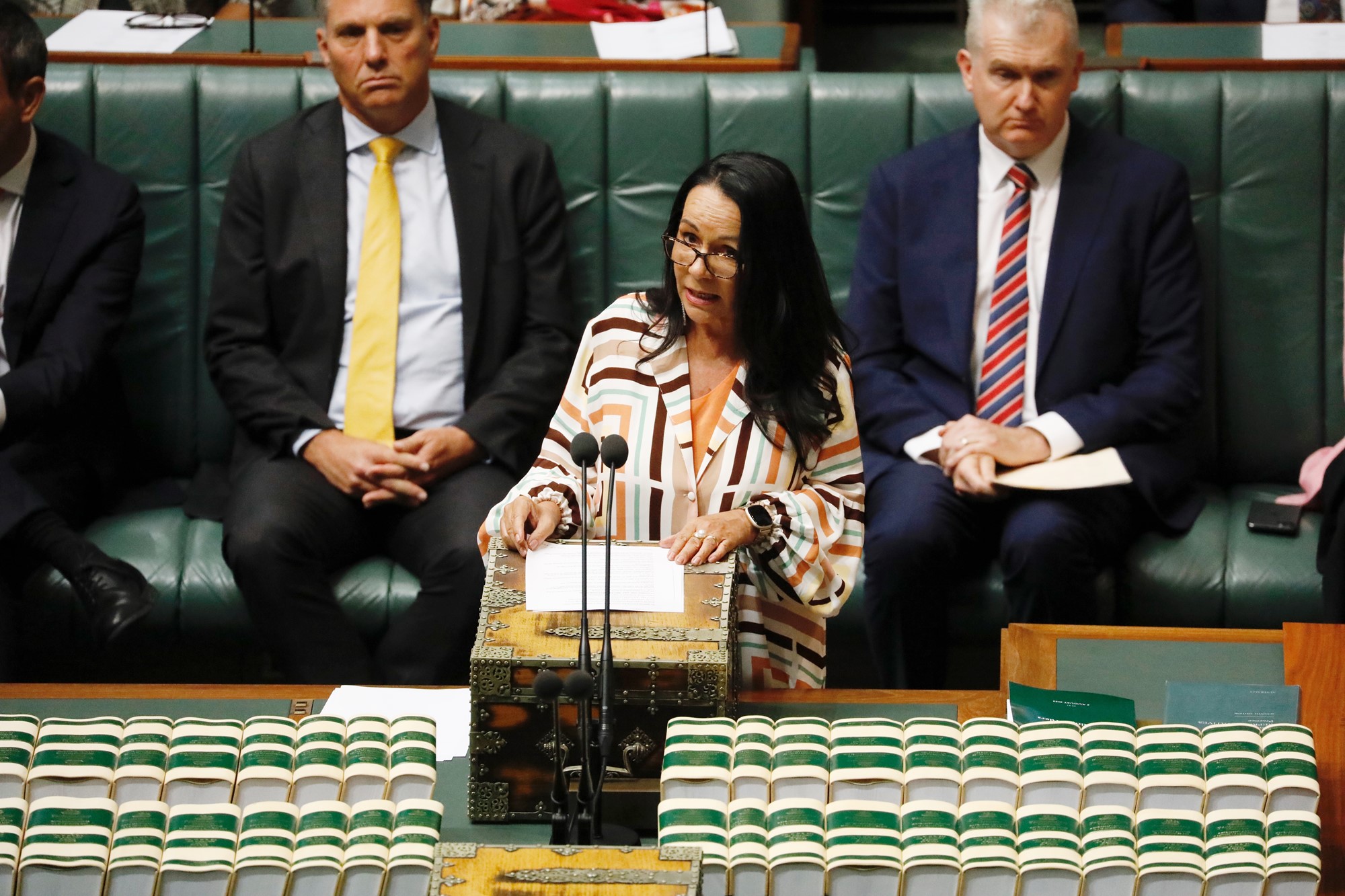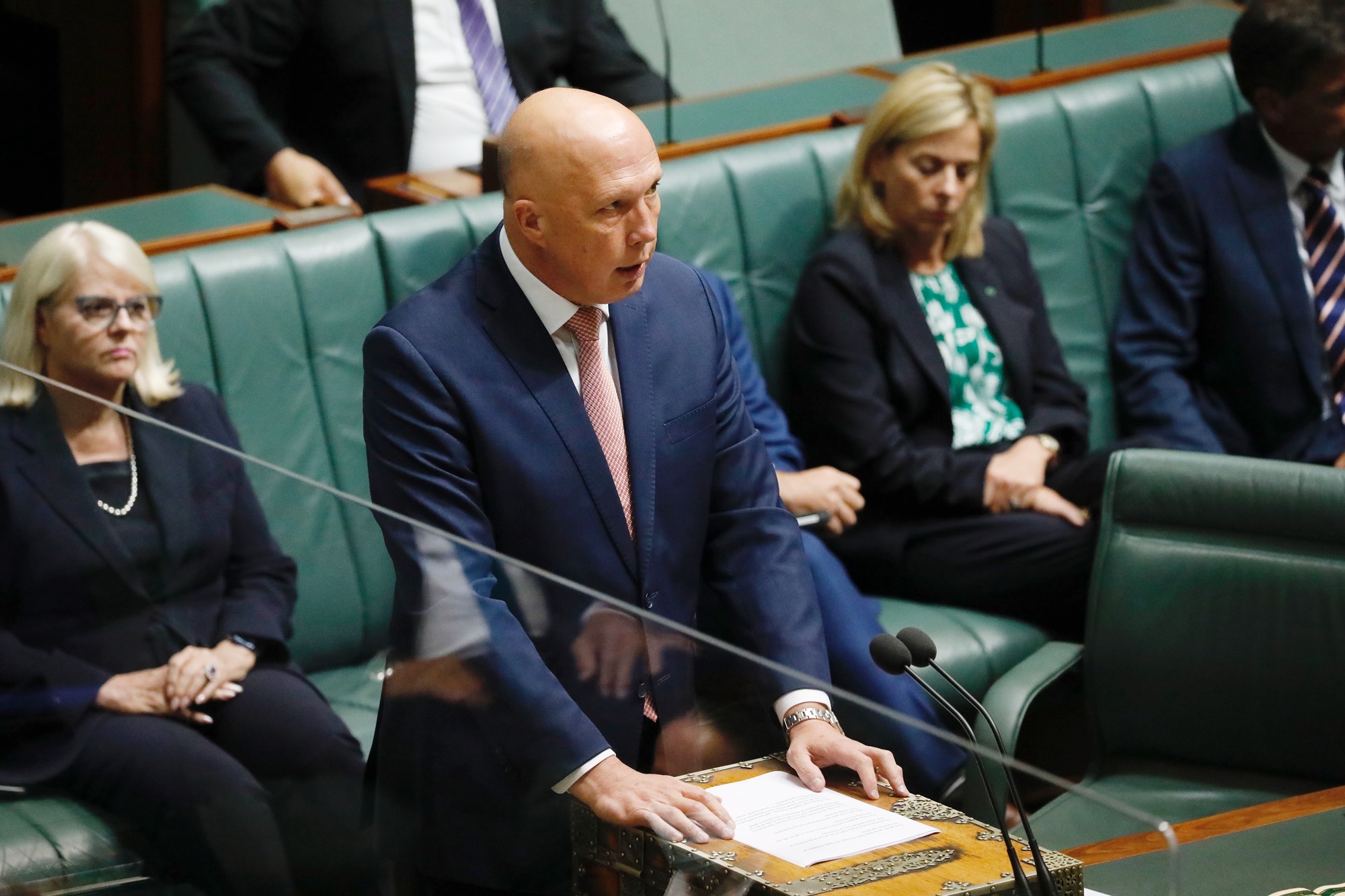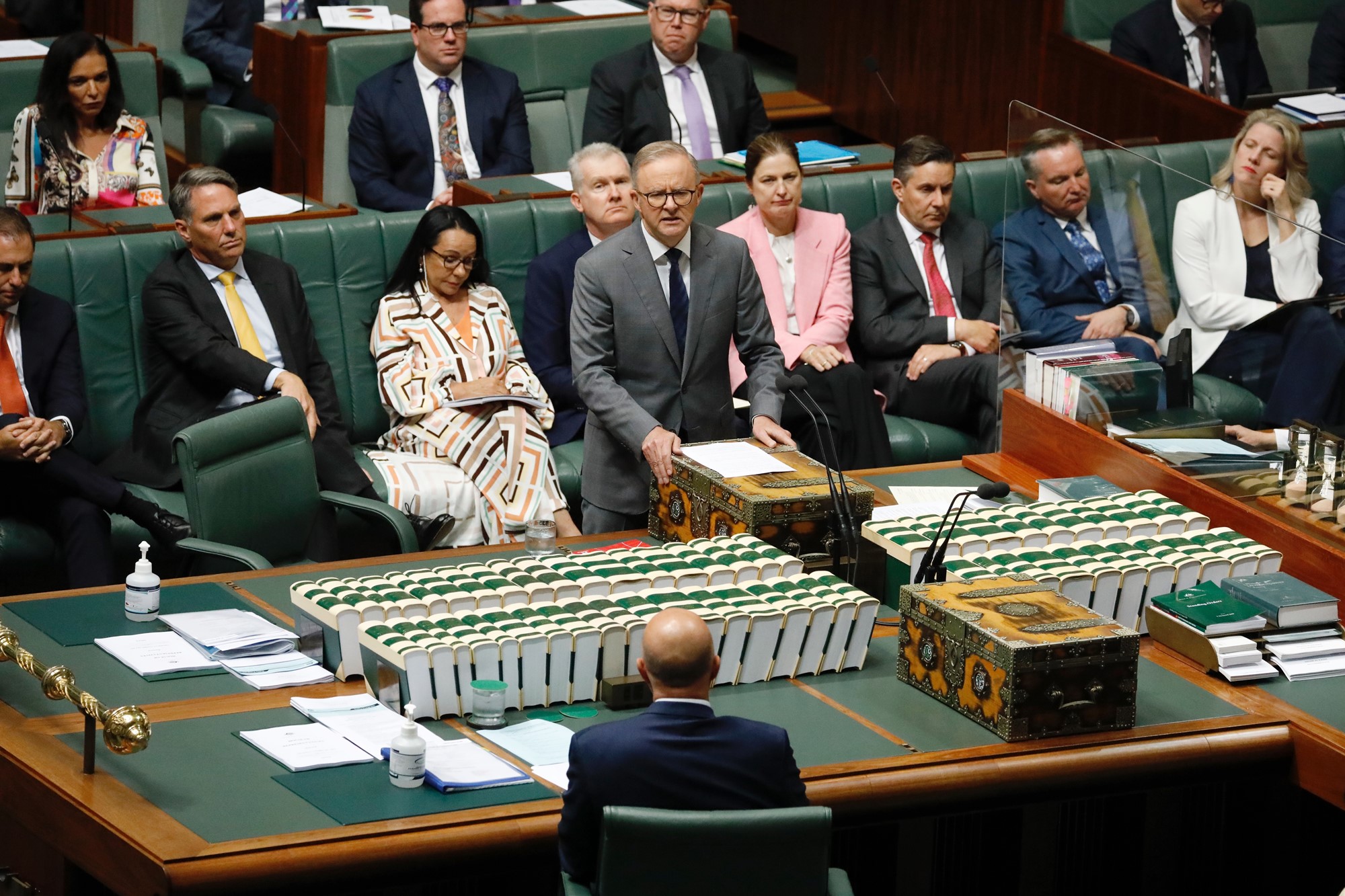The federal government has released its Closing the Gap Implementation Plan, with $424 million in new money to address Indigenous disadvantage across areas such as housing, food, education and water infrastructure.
It comes on the 15th anniversary of then-prime minister Kevin Rudd's historic apology to the Stolen Generations.
Look back at our blog for Monday's updates as they happened.
Key events
Live updates
We'll wrap up our live coverage here
By Brianna Morris-Grant
Thanks for joining us today as we covered PM Anthony Albanese's speech marking the 15 anniversary of the Stolen Generations apology.
You can recap the key moments below, or download the ABC News app and subscribe to our range of news alerts for the latest news.
You can also watch in full here on the ABC Youtube channel.
Bye for now!
What does the plan include?
By Brianna Morris-Grant
Now that the speeches are done, here is what Mr Albanese says the implementation plan includes in his own words:
- $150 million over four years for the National water agreement to support First Nations water infrastructure and provide safe and reliable water for remote and regional Indigenous communities.
- $117 million Commonwealth contributions to a new 1-year partnership with the Northern Territory government to accelerate the building of new remote housing.
- $11.8 million over two years for the National strategy for food security in remote First Nations communities.
- Continued funding of $68.6 million over two years for family violence and prevention legal service providers.
- $21.9 million over five years for up to seven place-based, aware and culturally responsive healing progress for those impacted by family violence or a risk of engagement with child protection.
- $21.6 million to support quality boarding for rural and remote students for an additional year.
'Cannot afford' to ignore Indigenous communities
By Brianna Morris-Grant
The federal government must "urgently determine" whether its investment in diversionary programs in Indigenous communities is being delivered as intended, said Mr Leeser.
"Today, on this anniversary, we must honour the past by answering the failures of this generation towards Indigenous children," he said.
"The present in so many regional and so many communities is terrible."
He has backed a call for a royal commission into "the abuse of Indigenous children", and called on the Prime Minister to support it.
"If we're to break the cycle we cannot afford to ignore these voices any longer," he said.
'All of us are failing' says Shadow Indigenous Australians Minister
By Brianna Morris-Grant
Fears of difficult issues "have frozen us", said Mr Leeser.
"Fears of making bad situations worse, fears about unintended offence that culturally misreading moments, fears of the stigma we create by highlighting failures, these are the fears we don't talk about but that most of us share," he said.
"They make us observers, not participants."
He has paid tribute to Senator Price and Lingiari MP Marion Scrymgour for "raising the alarm" on the issues in Alice Springs.
"From both sides of the aisle, two Indigenous Parliamentarians, participants, who have not been afraid to speak the truth," he said.
"The truth about alcohol, the truth about violence, and the truth about our continued failure as Australians.
"I say to the Prime Minister we all have to stop being observers, all of us.
"Yes, it's right to remember the past, yes it's right to want to change the future, but our place is here in the present and that's where all of us are failing."
Leeser: 'We remember the apology'
By Brianna Morris-Grant
Shadow Minister for Indigenous Australians Julian Leeser is now speaking in the House.
"And on this day, we remember the apology," he said.
"An apology for children taken away from parents, family, communities and culture, an apology for the brothers an sisters separated, an apology for the forced relocations away from country.
"An apology, to use the word from Neville Bonner's maiden speech, to those who were shot, poisoned, hanged and broken in spirit until they became refugees in their own land."
'Disgrace' that First Nations communities without water
By Brianna Morris-Grant
Minister for Indigenous Australians Linda Burney told the house it was an "absolute disgrace" for Indigenous communities to lack infrastructure.

"It is almost impossible for some people to imagine what it is like to live your whole life in a place where the water is not safe," she said.
"Where dialysis machines cannot work because the water is not clean enough, and we all know of the enormous problem of renal failure in our communities."
We'll have a bigger breakdown of the Closing the Gap plan's different measures coming soon.
Dutton apologises for boycotting apology
By Brianna Morris-Grant
Liberal leader Peter Dutton says he was wrong to boycott the parliament's apology to the Stolen Generations in 2008, and has apologised.
"I failed to grasp at the time the symbolic significance to the Stolen Generation of the apology," Mr Dutton said.
"It was right for Prime Minister Rudd to make the apology in 2008."
- Political reporterJake Evans has the story here.
Burney: 'Let's move forward for everyone'
By Brianna Morris-Grant
Indigenous Australians "deserve nothing less" than the apology, said Minister Linda Burney.
"The apology delivered by Prime Minister Rudd was at its core about healing, healing deep wounds, closing a painful chapter of denial of our history and opening a new chapter of our collected story, a better chapter," she said.
"It was about people, real people, the people joining us today. Thank you so much."
She said the Closing the Gap plan and the Voice was a chance to have "an impact on the ground and in communities".
"To do otherwise risks repeating the mistakes of the past so I say, do not hold us back, let's move forward for everyone," she said.
Linda Burney: Stolen Generations 'one of the darkest chapters in our history'
By Brianna Morris-Grant
Minister for Indigenous Australians Linda Burney has started her speech by quoted the late Archie Roach's 'Took the Children Away'.
"Archie spoke of the truth that for many years was denied, denied by governments, and denied by parliaments," she said.
"Children were removed from their families because of the colour of their skin and it was the government that did it.
"Most Australians did not know of this reality.
"For decades, there was a stubborn silence, but many of those women have suffered a private pain of unbearable loss.
"It was and is one of the darkest chapters in our history."
Dutton apologises for not attending apology
By Brianna Morris-Grant
Opposition leader Peter Dutton has apologised for not attending the apology 15 years ago.
"I want to speak directly to those in the gallery today and further afield who are part of the Stolen Generation and those who are descendants or are connected to the issue," he said.
"And I want to say in an unscripted way - I apologise for my actions and the Prime Minister's frequently able to point it out that I didn't attend the chamber for the apology 15 years ago.
"I have apologised for that in the past and I repeat that apology again today.
"In 2008, I had been out of the Queensland Police Force for about nine years and I was still and probably truthfully to this day lived with those images of turning up to domestic violence incidents where Indigenous women and children had suffered physical abuse, certainly mental abuse."
He described believing at the time that the situation needed to be addressed and violence "curbed" before an apology was made.
"I failed to grasp at the time the symbolic significance to the Stolen Generation of the apology," he said.
"It was right for Prime Minister Rudd to make the apology in 2008.
"It's right that we recognise the anniversary today, it's right that the government continues its efforts and in whatever way possible, we support that bipartisan effort."
Dutton says he 'fears we are failing again'
By Shiloh Payne
Peter Dutton isn't only reflecting on past actions today, but also what's happening currently.
"I fear we are failing again this very day for which a future apology will be necessary," Mr Dutton says.
"Ironically the situation in Alice Springs has highlighted children suffering in a harmful situation which is suffocating their chances of breaking a vicious cycle.
"Authorities have decided to put culture and other considerations above the best interests of those children in leaving them in harm's way."
Dutton welcomes Closing the Gap plan
By Brianna Morris-Grant
Mr Dutton said the national apology was a "profound moment" for Indigenous Australians.
"15 years have past since the apology and this is an occasion for delicate reflection," he said.
"The national apology was about Australians acknowledging the sins of the past.

"The cold, confronting, uncomfortable truth as Prime Minister Rudd put it."
Dutton: 'Nations have complex histories'
By Brianna Morris-Grant
Opposition leader Peter Dutton has told the House nations have "complex histories".
"A mature nation doesn't cherry pick from the past or doesn't rewrite or cancel parts of our history," he said.
"But rather a mature nation is one that speaks truthfully and in totality about its history.
"One which embraces both the light and dark chapters of its national narrative.
"Australians have every right to beproud of so much that was accomplished by our forebears, they helped build the modern nation in which we are so lucky to live today.
"But we also acknowledge that our forebearers committed serious wrongs."
Peter Dutton speaking
By Brianna Morris-Grant
The Prime Minister has now finished his speech — we'll cover it more in detail shortly.
Opposition leader Peter Dutton is now speaking.
Prime Minister speaks on Voice to Parliament
By Brianna Morris-Grant
Mr Albanese has said he is optimistic Australians will suport "justice, decency and respect" in a referendum on the Voice to Parliament.
"The Voice won't be a funding body," he said.
"It won't run programs, it won't have a power of veto, it will be about recognition of the continent's First People in the nation's birth certificate and it will be about consultation.
"And because of it, governments will make better decisions, coordinated and without duplication leading to better outcomes.
"Recognition is the 'what.' The Voice is the 'how.'
"This isn't about politics, this isn't about politicians - this is about people - people striving to make themselves heard across our great nation.
"In the regions and beyond in the remotest corners of our vast continent.
"It is not a radical change, but it is a change for the better."
'We have to do this work together'
By Brianna Morris-Grant
The PM has thanked Pat Turner and the Coalition of Peace for their work with the government.
"It will be a long time before we can say we have done enough, but we have to do this work together," he said.
"Day after day, week afterweek.
"On 26 May, it will be six years since the Uluru Statement from the Heart was delivered after the First Nations National Constitutional Convention.
"There has been no haste, no short cuts.

"This is a culmination of years of discussion, consultation and hard work by Aboriginal and Torres Strait Islander people as well as others including people in this place.
"And what shines through most brightly is the desire to bring us all closer together as a people reconciled and our great nation made greater."
New plan a 'concrete demonstration' of advancing solutions
By Shiloh Payne
Mr Albanese says today he is presenting the implementation plan.
"It is a concrete demonstration of how we will advance real-world solutions that improve the lives of Aboriginal and Torres Strait Islander peoples," he says.
"As well as reaffirming Closing The Gap as a top priority for my government, our plan reflects our unwavering commitment to working in partnership with Aboriginal and Torres Strait people.
"It is about action, action that gives a purpose and direction to our efforts to transform government and enables full participation and self-determination of Aboriginal and Torres Strait in our national life."
Still 'a long way to go' to close the gap
By Brianna Morris-Grant
The PM said there is still "a long way to go" to close the gap.
"Just how far is spelt out each year in the Closing the Gap report," he said.
"As of next year, the report will be issued as it was intended in conjunction with the apology anniversary.
"When it was stable a few months ago, the gaps not only persist but some are getting bigger.
"The report lays out forensically one lopsided statistic after another, in health, education, incarceration rates and especially damning, life expectancy.
"These are not gaps, they are chasms.
"It is clear that not enough support has been directed towards organisations to deliver for communities.
"It is clear that we have leapt too swiftly from a climate of forceful intervention to simply telling communities, 'you are on your own'.
"We have seen this in Alice Springs and in so many communities beyond. I went to Alice to listen, to hear from people on the ground."
Apology was a 'proud' day for Albanese
By Shiloh Payne
Anthony Albanese is reflecting on this day 15 years ago.
"The apology was the first act on the first parliamentary sitting day of the Rudd Government.
"It was certainly my proudest moment in this chamber and from Prime Minister Rudd we heard the words that reverberated across Australia, I am sorry on behalf of our nation," Mr Albanese says.
"Contrary to the doomsayers, it was a positive moment for the nation, a moment of unity, a moment on the road to healing and unburdening.
"And for everyone who had put themselves through the ordeal of reliving their childhood, and I thank those men and women who spoke to me this morning about their experience, this was confirmation that their voices had at last been heard."







